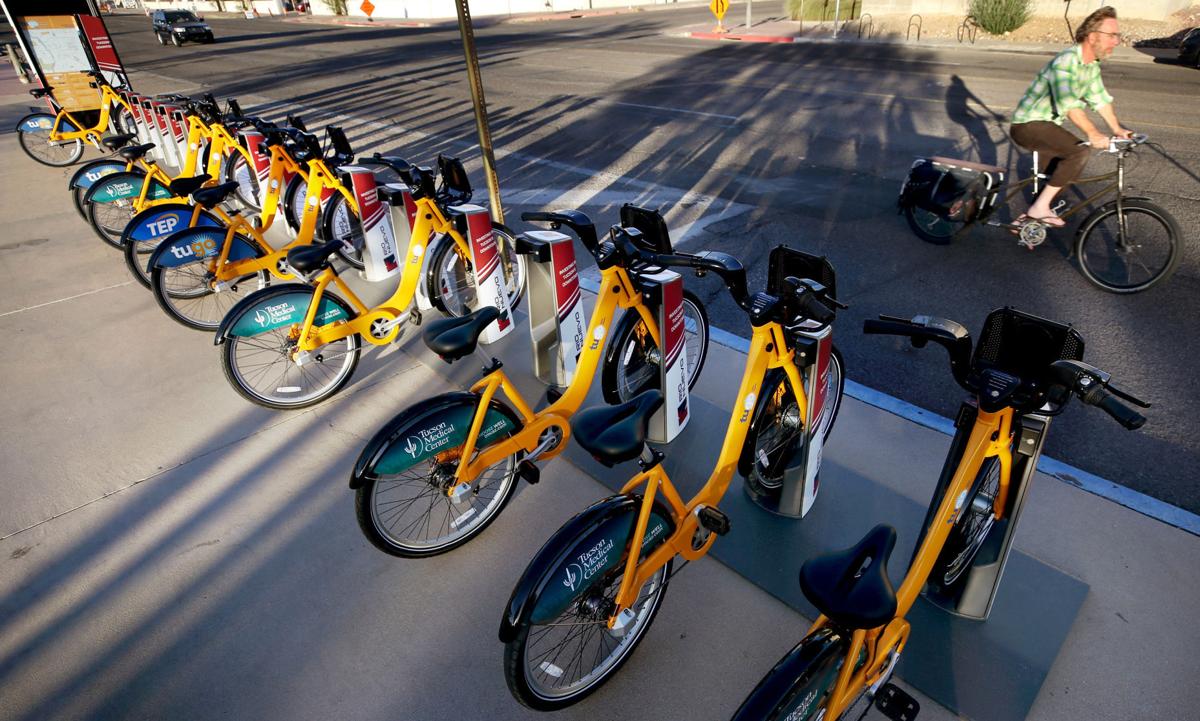I stepped out of my front door last Monday, started a stopwatch and strolled toward Pima Community College’s downtown campus.
Instead of hopping on my beloved commuter bike or into my equally beloved Ford Tempo, I was on my way to the nearest Tugo bike-sharing station to try out Tucson’s newest transportation option.
Including the seven-block walk to the station and another block from where I parked the bike, it took a flat 20 minutes to complete the 1.8-mile journey from my door to my desk. Not bad.
Using my own bike or car is obviously faster, though not by as much as you might think. On Tuesday and Wednesday I timed my bike and car commutes for the sake of comparison and learned that — almost to the second — they take the same amount of time: just over 10 minutes.
The Tugo bikes themselves are deceiving. They are hulking, bright yellow things that weigh in at a whopping 50 pounds, according to the city of Tucson’s contract with Shift Transit, the company hired to operate the system. But despite their heft and studied indifference to aerodynamics, the bikes can get up and go. On a flat stretch of Stone Avenue near the office, I was able to sustain a respectable 19 mph, a notable achievement given that the Tugos weigh three times as much as my road bike.
The seats are fairly comfortable and easily adjustable, the brakes work great, the front and rear lights make you visible to motorists, the shifters are simple and a small front basket with bungee cords allows for small errands. Though not much to look at, they are supremely functional bicycles.
In a more impressive field test, Krista Hansen, with the city transportation department’s bike and pedestrian program, recently raced the full 106-mile El Tour de Tucson on one of the Tugo bikes in 8 hours and 45 minutes, averaging a difficult-to-believe 12.1 mph, according to online results. Forty-five minutes of that time was for eating snacks, she clarified.
“After 106 miles on this 3-speed, 47-pound beast, I highly recommend Tugo Bike Share,” she wrote in an online post.
“Overall, the bike totally held up,” she later told me. “We had no technical issues, no problems with flat tires or anything like that.”
I found the system fairly easy to use, in part because of a smartphone app — CycleFinder — that allows users to find stations with available bikes and empty docking stations, as well as pay and unlock bikes. Shift Transit provided the Road Runner with free passes to try it out.
For those without smartphones, Shift Transit’s local general manager, Priscilla Teran, said daily passes can be purchased for $8 at stations with payment kiosks.
The day passes are largely targeted at tourists or visitors, but there are month- and year-long passes available for longer-term visitors and locals.
The monthly passes cost $18 and the annual pass costs $80. Seniors enjoy a reduced price of $65. Additionally, for SNAP participants, there is a $5 annual pass. Teran said Shift Transit is exploring ways to make the discounted price available to more low-income users.
All of the passes come with an unlimited number of 30-minute rides during the designated period before additional charges kick in. That means riders need to dock their bikes before the time runs out, or be OK with the additional $2 or $4 that will be added for every extra 30 minutes.
The network of 36 stations is heavily concentrated in the downtown area, but stretches out a few miles in all directions.
The southernmost station is at the South Tucson Municipal Complex, the westernmost at the base of Tumamoc Hill, the easternmost at Himmel Park and there are two tied for northernmost on Copper Street between Mountain and Campbell avenues.
“It’s going very good,” Teran said of Tugo’s first week of operation.
There’s been an even split between month- or year-long members and day users, she said, a ratio the company is pleased with.
Many riders are university students, and the data show spikes around noon, when workers hop on a bike to go get a bite to eat without having to drive and find parking. While avid bike commuters may not be the target audience, Teran said there are many Tucsonans without bikes but a degree of interest in cycling for whom Tugo may a good jumping off point.
To increase interest, Tugo ambassadors will be at heavily used stations this week handing out free passes and teaching would-be riders how to use bike shareware. Also, day passes will be free at kiosks and on the phone app every Tuesday in December, she said.
For more information on the bike share program, go to tugobikeshare.com





